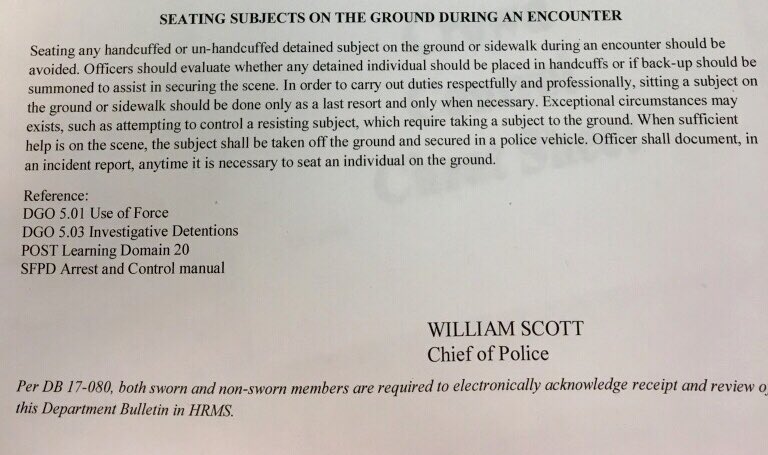Making suspects sit on ground is ‘demeaning,’ San Francisco police chief says

San Francisco CA December 13 2018
Police officers in San Francisco may no longer demand that suspects – whether handcuffed or not – sit on the ground or sidewalk at a crime scene, the city’s police chief writes in a department memo.
The practice is viewed as “demeaning” to suspects, city police Chief William Scott has determined, according to the Bay Area’s FOX 2.
The change is “aligned with 21st century policing, our department values and our commitment to providing safety with respect to everyone whom our officers encounter,” a police department spokesman told FOX 2.
@SFPD defends new policy prohibiting officers from telling people to ‘sit down.’ #SFPD spokesman says the change is “aligned with 21st century policing, our department values and our commitment to providng safety with respect to everyone whom our officers encounter.”
“In order to carry out duties respectfully and professionally, sitting a subject on the ground or sidewalk should be done only as a last resort and only when necessary,” the chief’s memo says.
“In order to carry out duties respectfully and professionally, sitting a subject on the ground or sidewalk should be done only as a last resort and only when necessary.”
The chief recommends instead that officers place suspects “secured in a police vehicle” when “sufficient help is on the scene.”
In times of “exceptional circumstances,” such as when a suspect is resisting arrest, officers may have no choice but to take a suspect to the ground, the chief acknowledges.
Whenever that happens, however, the chief wants to know about it.
“Officer shall document, in an incident report, anytime it is necessary to seat an individual on the ground,” the chief writes.
“Officer shall document, in an incident report, anytime it is necessary to seat an individual on the ground.”
The memo does not mention any specific incidents as having prompted the policy statement.
Scott became the city’s police chief in January 2017 after serving 27 years in the Los Angeles Police Department, according to his official San Francisco Police Department biography.
Earlier this month, a study by the University of California at Berkeley credited an increase in foot patrols by San Francisco police with helping to reduce crime in the city.
The city reassigned about 3.5 percent of its officers to foot patrols in summer 2017, and saw drops in assaults, larceny and vehicle thefts, the study said, according to the Daily Californian.
But the department has also seen its share of turmoil. Last week the family of a 21-year-old man – who was killed by a San Francisco police officer in 2016 — filed a wrongful death lawsuit against the city, the San Francisco Examiner reported.
The suit alleges that police overreacted to a situation at a barbershop instead of using de-escalation tactics being encouraged since 2016, the report said.
Police officers in San Francisco may no longer demand that suspects – whether handcuffed or not – sit on the ground or sidewalk at a crime scene, the city’s police chief writes in a department memo.
The practice is viewed as “demeaning” to suspects, city police Chief William Scott has determined, according to the Bay Area’s FOX 2.
The change is “aligned with 21st century policing, our department values and our commitment to providing safety with respect to everyone whom our officers encounter,” a police department spokesman told FOX 2.
@SFPD defends new policy prohibiting officers from telling people to ‘sit down.’ #SFPD spokesman says the change is “aligned with 21st century policing, our department values and our commitment to providng safety with respect to everyone whom our officers encounter.”
“In order to carry out duties respectfully and professionally, sitting a subject on the ground or sidewalk should be done only as a last resort and only when necessary,” the chief’s memo says.
“In order to carry out duties respectfully and professionally, sitting a subject on the ground or sidewalk should be done only as a last resort and only when necessary.”
The chief recommends instead that officers place suspects “secured in a police vehicle” when “sufficient help is on the scene.”
In times of “exceptional circumstances,” such as when a suspect is resisting arrest, officers may have no choice but to take a suspect to the ground, the chief acknowledges.
Whenever that happens, however, the chief wants to know about it.
“Officer shall document, in an incident report, anytime it is necessary to seat an individual on the ground,” the chief writes.
“Officer shall document, in an incident report, anytime it is necessary to seat an individual on the ground.”
The memo does not mention any specific incidents as having prompted the policy statement.
Scott became the city’s police chief in January 2017 after serving 27 years in the Los Angeles Police Department, according to his official San Francisco Police Department biography.
Earlier this month, a study by the University of California at Berkeley credited an increase in foot patrols by San Francisco police with helping to reduce crime in the city.
The city reassigned about 3.5 percent of its officers to foot patrols in summer 2017, and saw drops in assaults, larceny and vehicle thefts, the study said, according to the Daily Californian.
But the department has also seen its share of turmoil. Last week the family of a 21-year-old man – who was killed by a San Francisco police officer in 2016 — filed a wrongful death lawsuit against the city, the San Francisco Examiner reported.
The suit alleges that police overreacted to a situation at a barbershop instead of using de-escalation tactics being encouraged since 2016, the report said.
FOX



